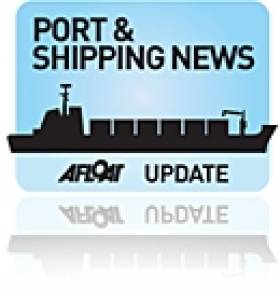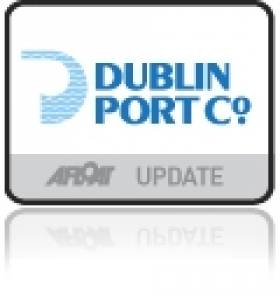Displaying items by tag: Londonderry Port & Harbour Commissioners
Former Dutch Dredger on the Boyne
#PORTS & SHIPPING- Berthed at the Steam Packet Quay, Drogheda is the suction-trailer dredger Lough Foyle (1979/868grt) which is on contract work with the Drogheda Port Company, writes Jehan Ashmore.
Following the sale last month of Hebble Sand, as previously reported on Afloat.ie (clcik HERE), the Lough Foyle (PHOTO) is now the only port-owned dredger on the island of Ireland. The Londonderry Port & Harbour Commissioners (LPHC) purchased the vessel from Dutch interests in 2009. She was originally the Saeftinge, built in 1979 at the Van Goor Scheepswerf in Monnickendam.
Since her introduction she has performed previous dredging operations to include the Drogheda Bar leading into the Co. Louth port. Her most recent contract was in Waterford Estuary, from where she arrived from on Tuesday after an overnight voyage.
In addition she has worked at the new Stena Line ferryport terminal at Loch Ryan, Cairnryan, to see related report click HERE. The Scottish ferryport is due to be officially opened tomorrow, to read more including the newly introduced 'Superfast' sisters click HERE.
Former Dundalk Dredger Sold in Dublin Port
#DUBLIN PORT-The former Dundalk Port Company grab-hopper dredger Hebble Sand (1963/757grt), which has been laid-up in Dublin since last Summer, was sold to new owners a month ago, writes Jehan Ashmore.
She remains berthed at the Bulk Jetty, Alexandra Basin, where she arrived from the Co. Louth port on 14 July, two days after the assets, liabilities and operations of Dundalk Port Company were transferred to Dublin Port Company by an order of statutory instrument. Against this background, Dublin Port Company decided to divest in the business of dredging resulting in placing the veteran vessel for sale.
During her career in Drogheda, she was the only dredger to be operated and owned by a port company apart from the suction-trailer dredger Lough Foyle (1979/868grt) operated by Londonderry Port & Harbour Commissioners.
Hebble Sand, registered in Dundalk has retained her original name since her launch from Richard (Shipbuilders) of Lowestoft for British Dredging. She has been kept in good condition considering a career nearing five decades. To read some of her last contracts undetaken outside her homeport, click HERE.
From a distance some people have mistaken Hebble Sand (PHOTO) to the last of the 'Guinness ships, as she bores a resemblance to the final custom-built stout tanker Miranda Guinness ( PHOTO), taken on her farewell sailing. The vessels shared a similar red funnel and black funnel, a roomy sized superstructure painted in cream above and a dark blue hull. To read more about the last of the brewery tanker-fleet click HERE.

























































